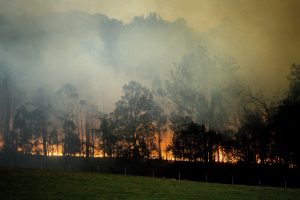The Australian bushfires have been a disaster for my nation, its ecology, and its already battered reputation on climate change. But they didn’t come out of the blue.
Scientists warned years ago that Australian bushfires would become much more dangerous due to climate change around 2020. Former fire chiefs warned months ago of a particularly bad fire season lying ahead; then a patch of Australia the size of South Korea went up in smoke.
We shouldn’t see this as just an Australian tragedy, a human interest story that will die out when the fires do. This has been a truly global tragedy, as we can see from the plumes of smoke that circumnavigated the earth and have emitted more CO2 than 100 countries.
“The name of the future is Australia,” famed Australian writer Richard Flanagan ominously predicted in a New York Times op-ed earlier this year. Australia’s bushfire season contains a number of lessons that can be of use not only to my own country, but hopefully to its Indo-Pacific neighbors and beyond.
A first lesson is that the forces of nature do not care about and do not stop for arbitrary lines on a map. Human civilization, however, is built on a reverence for such lines. And we saw the painful consequences of this tension recently when the Australian states of Victoria and New South Wales had to deal with firefronts spanning and crossing their shared border.
One potential response was to stick to the bureaucratic argument that, because the wall of flames had crossed a border, it was then someone else’s problem. This may have been technically true, but it didn’t pass muster with Australians when their safety was under threat.
Just as in earlier disasters, like the 2009 Black Saturday bushfires, in this bushfire season Australians expected the federal government, the highest authority in the land, to commit all available resources and lead a national response and to coordinate relief and recovery efforts.
A second lesson is that, although climate change action is the prisoner’s dilemma from hell and defection hurts every nation, spoiling that delicate process is remarkably easy.
In my country, we’ve seen this shamelessness made flesh in self-serving legalistic arguments by our national leaders that since Australia only contributes 1.3 percent of global carbon dioxide emissions, even if it were carbon-neutral it would still not have an effect on climate change.
But ask yourself what would happen if other countries copied Australia’s climate policies. Disaster would happen. Global temperatures would rise by 0.1 degree if other countries used Kyoto credits to meet their targets. And a cataclysmic 5 degree rise by 2100 would be within reach if they bought into the “we don’t matter in the scheme of things, so why bother?” argument.
It’s just not true that we don’t matter.
Australia has been ranked 14th out of over 200 countries in CO2 emissions. Per capita, we are in fact a larger emitter than the United States, Europe, India, Brazil, and China — to whom our government likes to point as all being bigger problems. We’re not insignificant actors in the creation of the problem, but we have a lot to offer in finding a global solution, too. Pinning the blame on others and saying “but they’re worse than us!” is not a responsible climate policy.
A third lesson from Australia’s bushfires — linked directly to climate change by at least 446 Australian climate, fire, and weather scientists and many of their international colleagues — is that although all nations will be hurt by climate change, the pain will not be evenly spread.
Some countries’ coastlines, cities, economy, ecology, security, and even viability as sovereign nation-states will be severely tested. While we often hear Bangladesh, the Maldives, and Pacific island states being mentioned, Australia is predicted to be disproportionately hit by the effects of climate change, as it has already begun to be, and may be among the worst hit.
The risks from climate change to Australia’s economy are formidable. Since we’ve got so much to lose, you’d think we’d be at the forefront of the global barricades to achieve a solution that was in our enlightened self-interest as well as in the interest of our species.
While we’re not right now, we will be again.
We have been focused on conserving life in Australia this long summer. In early January in smoke-filled Canberra, I addressed parliamentarians from 30 Asia-Pacific countries on climate change. In my speech, I paraphrased Winston Churchill in warning that a shirker of climate change action is someone who feeds a crocodile hoping to be eaten last.
Time is ticking for us to commit to and implement climate change actions that will mean our kids have some chance of inheriting the same lucky country and planet we have enjoyed.
Luke Gosling is the Member of Parliament for Solomon (Darwin) in Australia.

































